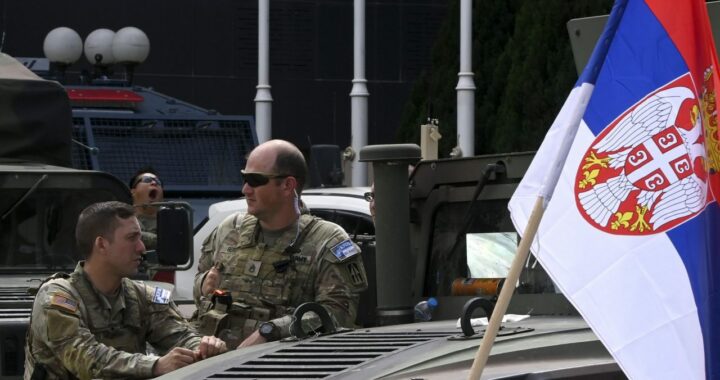

 Soldiers of the US contingent of the NATO-led international peacekeeping Kosovo Force (KFOR) take positions in front of the municipality building in Leposavic, Kosovo, June 2, 2023. Photo: EPA-EFE/GEORGI LICOVSKI
Soldiers of the US contingent of the NATO-led international peacekeeping Kosovo Force (KFOR) take positions in front of the municipality building in Leposavic, Kosovo, June 2, 2023. Photo: EPA-EFE/GEORGI LICOVSKI
The German-Kosovo Economic Chamber said on Thursday that continued unrest in the Serb-majority north of the country might prompt German companies to abandon actual or planned investments.
The German-Kosovo Economic Chamber, KDWV, on Thursday warned that the political crisis in Kosovo due to the tense situation in the Serb-majority north of the country might prompt German companies to withdraw their current or planned investments.
Germany’s Ambassador to Kosovo Jorn Rohde, reiterated the KDWV declaration on Twitter, writing that “concerning damage for Kosovo’s economic prospect are already on the horizon, damaging its reputation and potential also vis-à-vis business community”.
KDWV represents a total of 198 companies and claimed in its declaration that “on a daily basis it hears growing concerns from complaints received” from these companies.
“The members of KDWV are concerned that German companies may give up their investments in Kosovo, or stop existing activities. News of political instability hurts the confidence of German customers and investors significantly. This has a negative impact on German-Kosovo economic relations and causes damage to Kosovo as a location for investment and business,” the declaration reads, urging de-escalation of tensions and a sustainable business environment.
Protests in three Serb-majority municipalities in the north of Kosovo started on May 26, on the first day of office of the three ethnic Albanian mayors who were elected in extraordinary elections on April 23, which were boycotted by local Serbs.
Protesters demanded that the new mayors use alternative buildings and not the municipality facilities in Zubin Potok, Zvecan and Leposavic. They also called for Kosovo Police forces to withdraw from the area.
On May 29, the second day of protests, violent clashes between protesters and soldiers of the NATO peacekeeping mission in Kosovo, KFOR, left 30 soldiers and around 50 protesters injured.
The EU and US increased their pressure on Kosovo, calling on it to de-escalate the situation, for the new mayors to work from alternative buildings, for Kosovo to hold extraordinary elections with the participation of local Serbs, and for Kosovo to start establishing a Serb-majority municipalities association.
The US cancelled Kosovo’s participation in Defender Europe 23 military exercise in late May, followed by EU which on June 14 announced measures against Kosovo, blaming PM Albin Kurti for failing to address the route cause of the protests.
The latest incident happened on Wednesday, when Serbia insisted it had arrested three Kosovo police officers inside Serbia, while Kosovo says the three officers were “kidnapped” within Kosovo’s territory.
On Thursday, Kurti announced that the “kidnapping” incident, which he called a “violation of the border by Serbia”, would force Kosovo “to increase border controls, which… may also include traffic stops”.
The Albanian-language publication of Radio Free Europe reported that around 60 goods trucks have been waiting to enter Kosovo at the Merdare border crossing with Serbia.
Kurti announced that, as “an immediate and necessary step, border controls with Serbia have been tightened, limiting circulation and increasing controls on vehicles coming from Serbia, especially transport ones”.
15 June 2023 - 16:47

Kosovo Serb party says construction of new river bridges in the ethnic...

The only three suspects arrested so far in Kosovo for the deadly attac...

Visar Syla, the Chief of Staff for North Mitrovica mayor Erden Atic, ...

A year after Serb gunmen shot dead a Kosovo Police officer in Banjska,...
Lorem ipsum dolor sit amet, consectetur adipisicing elit. Optio, possimus obcaecati repellendus minus ut voluptatum laboriosam, neque fuga velit! Asperiores sint facere accusamus. Enim, omnis vero magnam beatae tenetur, et, architecto aliquid neque facilis itaque doloremque maxime sit. Alias sapiente ab odio corrupti reprehenderit beatae eius quis tempora, perspiciatis obcaecati culpa debitis molestias, officiis, nulla iste delectus tenetur sunt dolorem ea perferendis laboriosam, praesentium voluptatibus velit atque sint. Eligendi deserunt fugiat molestiae ex, animi, libero asperiores quis perferendis vero quibusdam, inventore dicta optio minus fuga reprehenderit officia quas dolorum error amet aliquid. Aut, non mollitia, corrupti nesciunt fuga vel hic.